I listen to you, Reader. I study your comments. I sympathize with your frustrations. If we didn’t live so apart, I’d loan you my power tools or let you borrow my flashlight. I’ll go to the ends of the earth to keep you and your rig happy and mobile.
Which is exactly what I did. I traveled to the faraway digital lands of Reddit, Quora and Twitter seeking answers to this pressing question: “Should I choose a generator or solar panels for my RV?”
Want to know what people think?
Hint: It all comes down to your heat tolerance!
Generator vs RV Solar Panels
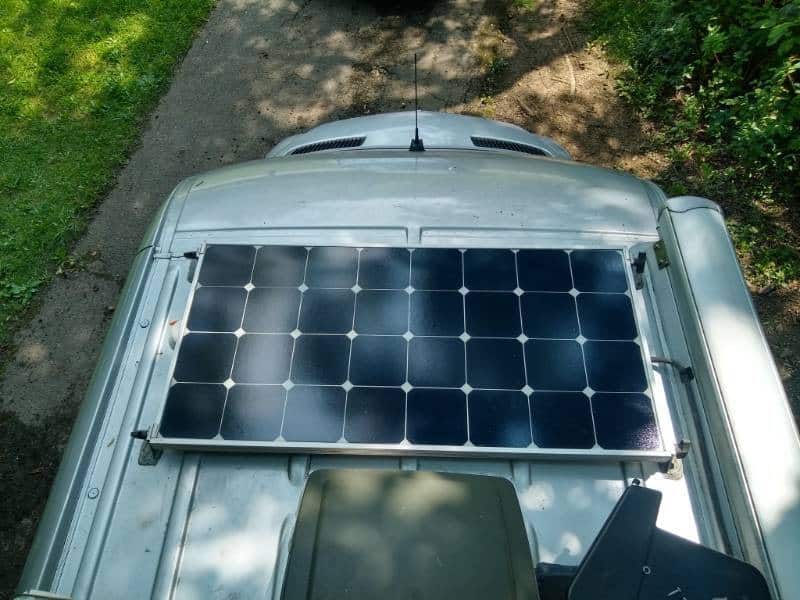
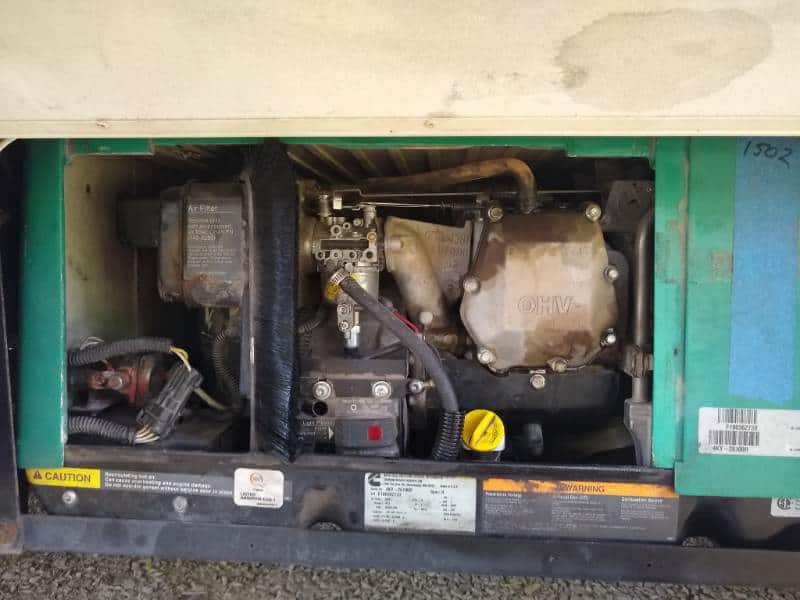
It’s a keep-you-up-at-night sort of question. But if you plan to boondock or dry camp, you must choose. Your OEM battery is probably big enough to run lights and pump a little water while at a rest stop, not to camp overnight.
- So do you spend the money on bigger solar panels, upgraded charge controller and larger batteries?
- Or do you just buy a generator and hand out free earplugs to your campground neighbors?
Here’s what people said about purchasing an RV generator vs solar – and what I think of their answers!
RV Power Conservation: Baby Steps, Baby Steps
Source: Reddit
Name: Regnillub
“If AC is a must, then you’ll need a generator. If you can do without AC (and a microwave) then solar is the way to go. Be sure to convert all your lights to LED (if they aren’t already). Install a USB outlet that‘s wired to 12 volts, that’ll keep all your electronics charged too.”
Reg brings up an important point: It’s useless spending hundreds of dollars on an RV generator if you haven’t toddled through the baby steps first.
- Substituting LED lights for incandescent lights
- Switching off (or installing inline switches) for phantom loads
- Downsizing your microwave (less wattage)
- Running your ceiling fans on the slowest speeds
- Installing a soft-start for the rooftop AC
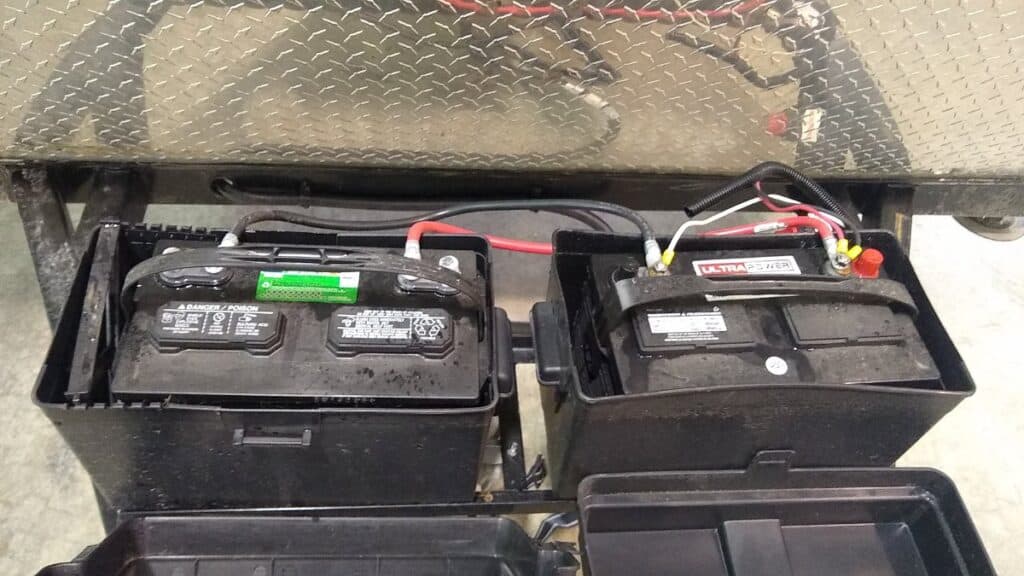
How to Power an RV with Solar: The Magic Number!
Source: Reddit
Name: Adub1979x
“I would double your battery banks [from 100Ah] … I run a 38-ft Class A on 60Ah per day. 3-4 days with my 400W of solar is all I need. I have a propane refrigerator so that helps.”
Adub knows how to save power! Most campers use 80Ah to 100Ah per day. He’s only using 60Ah, and that’s with a Class A motorhome!
I want to draw attention to that 400-watt number. Boondockers often have 400-450 watts of solar power. Here’s why:
- Space Constraints. 400-450 watts is four 100-watt panels or three 150-watt panels. That’s as many panels as you can comfortably fit on a smaller travel trailer without resorting to custom mounting solutions.
- Current Requirements. At 18V panel power, 450 watts delivers 25 amps. Meanwhile, a popular aftermarket boondock upgrade is a 30A solar charge controller. The first dovetails with the second!
- Wire Simplicity. Most 30A systems use 10GA wire. Now – stay with me here – anything larger than 10GA can be difficult for Average Joe DIY to work with. For instance, most handheld crimpers only go up to 10GA. Anything bigger, and you’ll need a hammer crimper.
So you see, a 400-450 watt solar panel system can fit atop most RVs, uses an affordable 30A charge controller, and gets by with common 10GA wire. So it all works out nicely!
Do You Like Toast?
Source: Quora
Name: Martin Healey
Do you like toast, Reader? If so, you might want to listen to Martin Healey.
“I use both [solar power and generator]. In the summer, sometimes I just have to run the air conditioner. I also like toast, and sometimes use the microwave.”
You know, I just realized — is Martin saying he makes toast with the microwave?? Because if so, someone should tell him that’s not what toast is …
“Most of the time, my 400 watt system keeps up with all my DC needs –”
Can I just interrupt again to point out that 400W number?
“– but if there is something specifically AC [alternating current], it is generator time. It is also really handy when you get a week of clouds.”
There are two takeaways here.
- If you like morning coffee and avocado toast, and you don’t want to build a campfire every sunrise, you might want a generator.
- Depending on where you live, solar power can be cheap or expensive.
Let’s dive into this idea.
If you live in coastal Washington, solar power is “expensive.” If you like in southern Utah, solar power is “cheap.”
It all comes down to what solar gurus call “peak sun hours.”
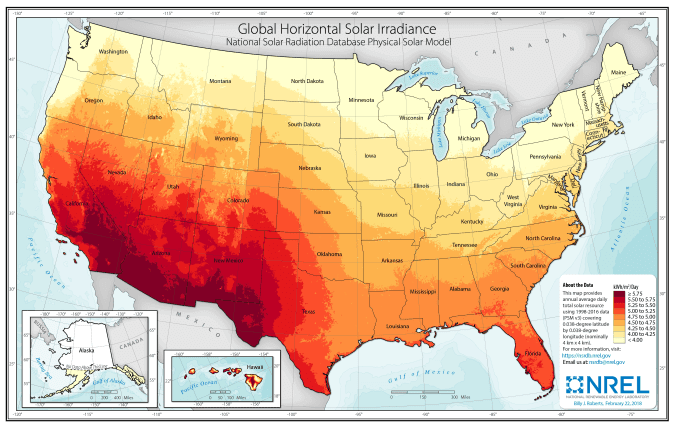
Solar panels produce power proportional to the amount of sunlight energy received. Longer days, hotter temperatures and fewer clouds = more available power.
RV Solar Panels: Silent and Stealthy
Source: Twitter
Name: Frater Jason
“I chose solar only (750w mounted, 200w portable),” says Frater Jason – or is it actually Jason Frater? “450w panel off a pallet could be as little as $150 and will work silently/automagically for decades with no fuel or oil changes.”
Now, I’m a bit of a creep, so I happen to know that F.J. drives a stealth van and has an adorable Boxer named Muffin (true story). So there’s an excellent reason why F.J. – J.F.? – uses solar power.
It’s quiet. It’s stealthy.
Here’s how decibels work: For every increase in 10 db, the sound is 10 times more powerful (not necessarily 10x louder, thanks to the miracle of the human ear).
A conventional open-frame gas-powered generator – the sort you see at construction zones – is 70-80 db.
Fair warning: If you run an open-frame generator at a campground, you will have no friends, nobody will ask you to their campfire, and everyone’s dog will poop in your campsite.
An inverter generator is just 50-60 db. That means a conventional RV gas generator could be up to a 1,000 times more powerful! That’s a huuuuuge difference! With an inverter generator, you can hold a normal conversation with the generator just a few feet away.
But a solar panel – well, that’s a whopping 0 db. Not a peep.
So if you’re also an urban stealth camper, or you camp in Walmart parking lots, or you frequent popular national park campgrounds, you’ll probably want solar. Many campgrounds don’t allow open-frame generators. Some, especially in the parks systems, are banning generators altogether!
Why Not … Both? RV generator AND RV solar?
Source: Quora
Name: Charles Jack
“Sometimes, if you are dry camping, and drawing from the batteries more that the solar panels can supply, you can fire up the generator for an hour or so a day to fully charge the batteries.”
I love this. Charles Jack points out this isn’t an either/or proposition. Use solar panels whenever possible. But if dam-it-I’m-freakishly-hot-and-don’t-care-anymore, and you just need to run the air conditioner, then you go ahead with that generator!
In fact, that’s exactly what our next respondent does …
RV with Solar (Almost) All the Way!
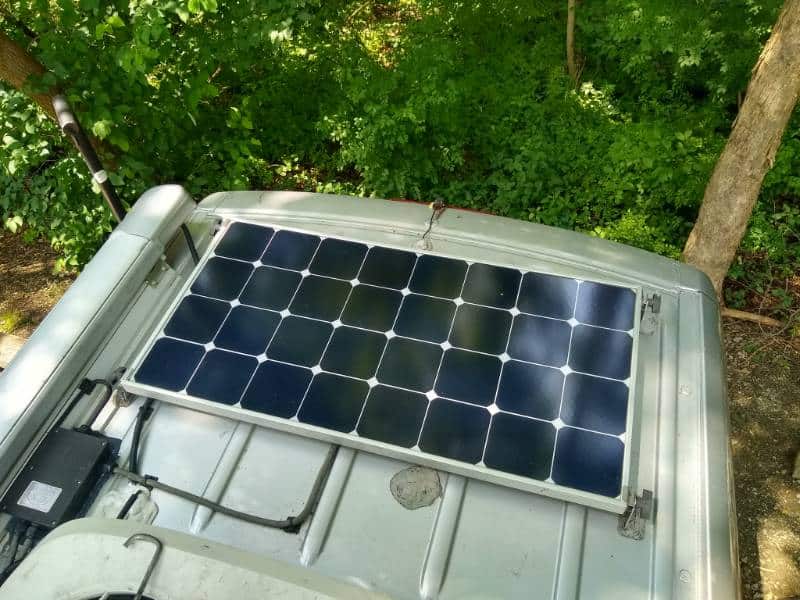
Source: Quora
Name: Robert Moe
“Solar panels are the gift that keeps on giving, especially if there mounted on the roof and don’t need to be messed with.
“However a generator is going to need constant fueling and oil changes, spark plugs. And you’ll have to constantly move the thing around unless it’s permanently mounted and plumbed in. Also the noise and smell thing.”
… Tell us how you really feel, Robert! Don’t hold back!
“– though we do have a backup generator.”
Sell out.
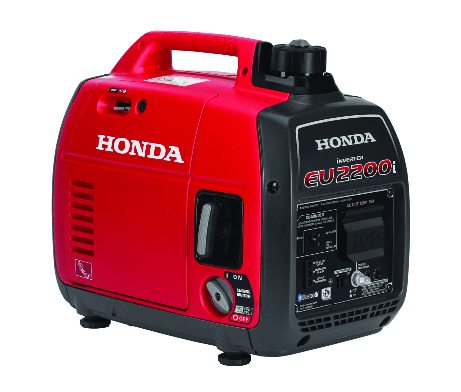
Standing Up for the Humble RV Generator
Source: Quora
Name: Jason McMillen
I did find a fervent generator advocate. Let’s hear what Jason M. has to say:
“The generator is the most reliable and trouble-free if installed properly. The key point about the generator is that it does not need 9 hours of sun filling batteries BEFORE you can have access to your power. It works in heat, cold, and, most importantly, nighttime.”
Spoken like a true engineer, Jason. What he’s saying is technically true.
“The best bang for the buck would be [a] generator especially if you are using the RV to travel.”
Jason is right about the small things, but I think he’s a bit harsh on solar power. Let’s play devil’s advocate.
- Most people don’t camp in frigid temperatures, so I’m calling that a moot point.
- Generators can only provide instantaneous power. You normally use power during the mornings and evenings, so what does it matter if a generator runs at night?*
- Solar panels can charge your system while you’re traveling. A generator cannot.
*The exception, of course, is if you need your air conditioner.
The Last Word on the Subject
Source: Quora
Name: Todd Main
“If you need [alternating current] power for things like the microwave, a typical coffee machine, or even your air conditioner, then you’ll want a generator.
“For my travel trailer, I have had great luck with the Predator 3500 watt generator from Harbor Freight. It’s less than half the price of the equivalent Honda model, but it has proven to be reliable for me and is pretty quiet (as these things go).”
Sorry to barge in, but can I just say: I’m not a Harbor Freight guy. Sorry, Todd, but I’d pay extra for the Honda. Or I’d buy a Champion (which, as I matter of fact, I have!).
“I also have a 100 watt solar panel and controller, which I use on most trips where we lack hookups. It’s just that sometimes – like in the height of summer – I like to have the generator to run the air conditioner.”
Spying a theme here, Reader? If you want to run your air conditioner, buy a generator!
Bonus: My Personal Favorite Answer
Source: Twitter
Name: Lester Walters
“No panel for me. I drive a giant inverter. #priuscamping.”
Way to e-flex your eco-muscles, Lester.
But with a theoretical towing capacity of just a few hundred pounds – and Toyota says you probably shouldn’t tow anything – the Prius is a distant dream for most of us.
We’re stuck with the gas-guzzlers.
Verdict: RV Generator or RV Solar?
Get both. Get an RV inverter generator AND solar panels.
Here’s what I recommend as a good starting point for anyone remotely serious about dry camping:
- A 400-watt solar power system with 30A MPPT controller
- 200Ah+ deep-cycle battery bank
- 2000W inverter generator
That’s the Dream Team. With this setup, you can run just about anything (except your air conditioner, of course). But yes, you can have your toast.
Leave a Reply